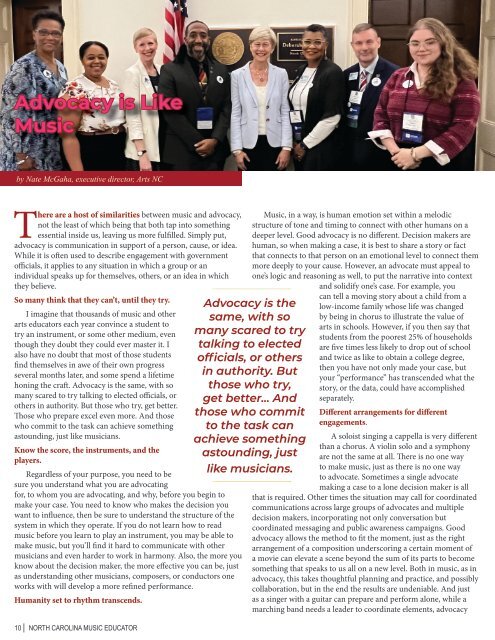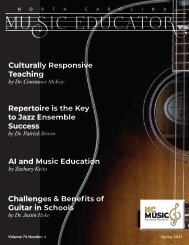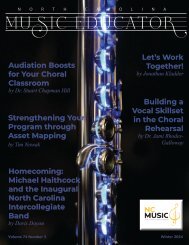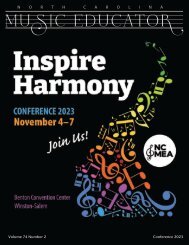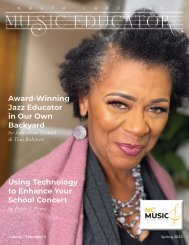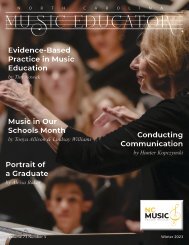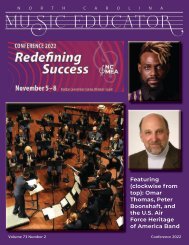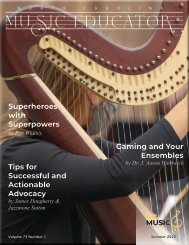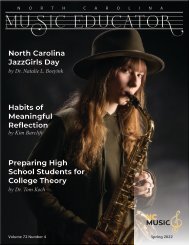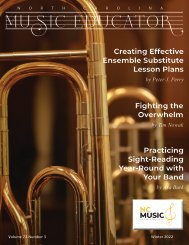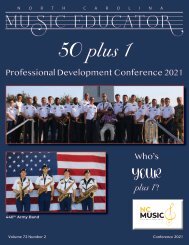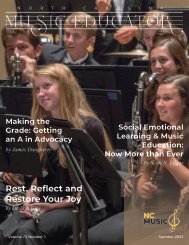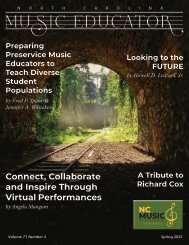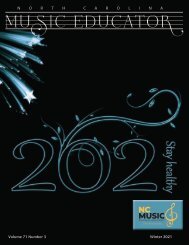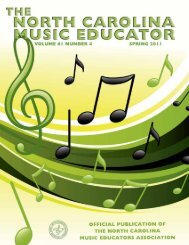You also want an ePaper? Increase the reach of your titles
YUMPU automatically turns print PDFs into web optimized ePapers that Google loves.
Advocacy is Like<br />
<strong>Music</strong><br />
by Nate McGaha, executive director, Arts NC<br />
There are a host of similarities between music and advocacy,<br />
not the least of which being that both tap into something<br />
essential inside us, leaving us more fulfilled. Simply put,<br />
advocacy is communication in support of a person, cause, or idea.<br />
While it is often used to describe engagement with government<br />
officials, it applies to any situation in which a group or an<br />
individual speaks up for themselves, others, or an idea in which<br />
they believe.<br />
So many think that they can’t, until they try.<br />
I imagine that thousands of music and other<br />
arts educators each year convince a student to<br />
try an instrument, or some other medium, even<br />
though they doubt they could ever master it. I<br />
also have no doubt that most of those students<br />
find themselves in awe of their own progress<br />
several months later, and some spend a lifetime<br />
honing the craft. Advocacy is the same, with so<br />
many scared to try talking to elected officials, or<br />
others in authority. But those who try, get better.<br />
Those who prepare excel even more. And those<br />
who commit to the task can achieve something<br />
astounding, just like musicians.<br />
Know the score, the instruments, and the<br />
players.<br />
Regardless of your purpose, you need to be<br />
sure you understand what you are advocating<br />
for, to whom you are advocating, and why, before you begin to<br />
make your case. You need to know who makes the decision you<br />
want to influence, then be sure to understand the structure of the<br />
system in which they operate. If you do not learn how to read<br />
music before you learn to play an instrument, you may be able to<br />
make music, but you’ll find it hard to communicate with other<br />
musicians and even harder to work in harmony. Also, the more you<br />
know about the decision maker, the more effective you can be, just<br />
as understanding other musicians, composers, or conductors one<br />
works with will develop a more refined performance.<br />
Humanity set to rhythm transcends.<br />
Advocacy is the<br />
same, with so<br />
many scared to try<br />
talking to elected<br />
officials, or others<br />
in authority. But<br />
those who try,<br />
get better... And<br />
those who commit<br />
to the task can<br />
achieve something<br />
astounding, just<br />
like musicians.<br />
<strong>Music</strong>, in a way, is human emotion set within a melodic<br />
structure of tone and timing to connect with other humans on a<br />
deeper level. Good advocacy is no different. Decision makers are<br />
human, so when making a case, it is best to share a story or fact<br />
that connects to that person on an emotional level to connect them<br />
more deeply to your cause. However, an advocate must appeal to<br />
one’s logic and reasoning as well, to put the narrative into context<br />
and solidify one’s case. For example, you<br />
can tell a moving story about a child from a<br />
low-income family whose life was changed<br />
by being in chorus to illustrate the value of<br />
arts in schools. However, if you then say that<br />
students from the poorest 25% of households<br />
are five times less likely to drop out of school<br />
and twice as like to obtain a college degree,<br />
then you have not only made your case, but<br />
your “performance” has transcended what the<br />
story, or the data, could have accomplished<br />
separately.<br />
Different arrangements for different<br />
engagements.<br />
A soloist singing a cappella is very different<br />
than a chorus. A violin solo and a symphony<br />
are not the same at all. There is no one way<br />
to make music, just as there is no one way<br />
to advocate. Sometimes a single advocate<br />
making a case to a lone decision maker is all<br />
that is required. Other times the situation may call for coordinated<br />
communications across large groups of advocates and multiple<br />
decision makers, incorporating not only conversation but<br />
coordinated messaging and public awareness campaigns. Good<br />
advocacy allows the method to fit the moment, just as the right<br />
arrangement of a composition underscoring a certain moment of<br />
a movie can elevate a scene beyond the sum of its parts to become<br />
something that speaks to us all on a new level. Both in music, as in<br />
advocacy, this takes thoughtful planning and practice, and possibly<br />
collaboration, but in the end the results are undeniable. And just<br />
as a singer with a guitar can prepare and perform alone, while a<br />
marching band needs a leader to coordinate elements, advocacy<br />
leadership is dependent upon each situation. You can prepare and<br />
present the case for a salary increase to your boss as a soloist, but<br />
advocating for raises for all educators would require a chorus of<br />
advocates with a good director and a plan to make sure everyone<br />
performs in harmony.<br />
Practice, practice, practice.<br />
The more you do anything, the easier it becomes and the better<br />
you are at doing it. A good musician never misses an opportunity<br />
to practice or perform, constantly evaluating to hone the craft and<br />
perfect the delivery. Advocacy is no different. There are countless<br />
opportunities in any given day to discuss the things we care about,<br />
and the more we speak up for whatever cause that may be, the<br />
easier it becomes, the better we become, and the more comfortable<br />
we can become with any given audience.<br />
You can feel it when it is right.<br />
So many people choose not to speak up for things that they feel<br />
are important. They assume someone else will do it and are likely<br />
to do it better. But if we all thought that way, nothing would ever<br />
happen. The thing that is so hard to explain about both music and<br />
advocacy to someone who has never tried, is just how good it feels<br />
once you start, how incredible it feels when you find your groove,<br />
and invigorating it feels when you can tell you have truly reached<br />
someone. Taking the time to learn an instrument can change the<br />
trajectory of an entire life. Taking the time to speak up for what is<br />
important, like arts education in your community, can change the<br />
course of countless young lives.<br />
What is Arts <strong>North</strong> <strong>Carolina</strong>?<br />
We are a nonprofit organization that works to advance public<br />
funding and policy that supports the arts and comprehensive arts<br />
education. To connect <strong>North</strong> <strong>Carolina</strong> arts advocates with their<br />
local, state, and federal elected officials, we provide resources and<br />
training for the entire state, and host our annual conference and<br />
advocacy event, ARTS Day, in Raleigh each year. We also help<br />
nonprofits and others learn how they can engage with candidates<br />
in elections, and with already elected officials. We also engage<br />
a professional lobbying firm to support our message at the NC<br />
General Assembly and our staff works year-round to provide our<br />
constituents with information and analysis of both state and federal<br />
funding and legislation. You can find out more about our work at<br />
ArtsNC.org.<br />
Arts NC’s most significant recent arts education<br />
accomplishment was the passage of the NC Arts Education High<br />
School Graduation requirement. In <strong>2023</strong>, we are working on<br />
legislation to create an Arts Proficiency High School Diploma<br />
Endorsement and a bill that would require every K – 5 public<br />
school student to have access to both visual art and music<br />
instruction by a licensed visual art/music educator once every five<br />
instructional days. Both these bills would mean more students in<br />
more arts classes and more educators needed to teach them.<br />
Arts NC is also a proud member of the NC Arts Education<br />
Leadership Coalition (AELC), along with NC <strong>Music</strong> <strong>Educator</strong>s<br />
Association and eight other music and arts educator professional<br />
organizations. We collaborate on advocacy efforts and discuss<br />
arts education policy moderated by our partners at the NC<br />
Department of Public Instruction. Arts NC also hosts the website<br />
ArtsEdNC.org which is the home of the NC AELC and is packed<br />
with information, training, and resources such as the Arts<br />
Education Data Project. Through this collaboration we can more<br />
effectively advance arts education at both the state and local level.<br />
Have your local school board pass an Arts ARE Education<br />
Resolution.<br />
So, what can you do locally to support arts education? One of<br />
the easiest and most effective ways is to work with your district<br />
leadership and superintendent to have your local school board pass<br />
an Arts ARE Education Resolution, which is part of a national arts<br />
education advocacy movement. Arts NC partnered with NCMEA<br />
to create an easy-to-use step-by-step toolkit to show you how.<br />
You can even include a student performance at the school<br />
board meeting when it is voted on to help mark the occasion. The<br />
text of the resolution states that your school system will maintain<br />
and grow arts education programs in the current school year and<br />
beyond. And while it does not bind them legally to do so, it is a<br />
good thing for them to think about. Especially if you have them<br />
pass it for Arts in Our Schools Month in March, right before they<br />
begin work on the following year’s budget.<br />
Advocacy and music are not all that different. Whether it is<br />
done solo or in collaboration with others, it has the potential to<br />
enrich the soul and change the world. But you can’t make music, or<br />
a difference, if you do not step up and get started.<br />
Opposite page: Past Southern Division president Sonja McLean Williams, NAFME state advocacy engagement manager Jazzmone Sutton, NCMEA executive<br />
director Susan Heiserman, NCMEA president Johnathan Hamiel, Rep. Deborah Ross, NAFME NEB equity representative Dr. Lenora Helm Hammonds,<br />
NAFME Southern Division president James Daugherty, NCMEA collegiate president Sabina Blue<br />
Above, left: Rep. Virginia Fox’s legislative assistant R.J. Martin, James Daugherty, and Dr. Lenora Helm Hammonds.<br />
Above, right: Johnathan Hamiel discussing the importance of Title 1 funding in <strong>Music</strong> Education to Rep. Virginia Fox’s legislative assistant R.J. Martin.<br />
10 | NORTH CAROLINA MUSIC EDUCATOR NORTH CAROLINA MUSIC EDUCATOR | 11


